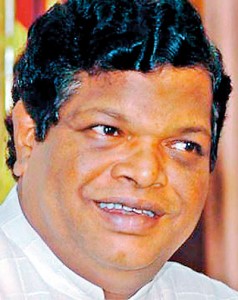Columns
5 billion buck bond bonanza: Gosh, didn’t they do well?
View(s): Perhaps it was beginner’s luck. Or how else do you explain the phenomenal killing made by a three-year-old company in the cut-throat world of bond business?
Perhaps it was beginner’s luck. Or how else do you explain the phenomenal killing made by a three-year-old company in the cut-throat world of bond business?But whatever the reasons may have been, the initial euphoria must be for the rest of Lanka’s 20 million people to take their beggared hands out of their centless pockets and raise a round of applause that a local bond trader, hardly out of its bassinet, was able to soar above the competition and scoop the jackpot of the century: the record bounty of Rs. 5.2 billion net profit in one year alone.
Take your time to think what this mind boggling figure represents. It means that this one bond trader made a net profit of 14 million rupees every day, poyas included for there was not a single day in the whole of an year ending 31st March 2016 that the sun didn’t smile or the moon failed to beam on the evergreen fortunes of Perpetual Treasuries, the company owned by Arjun Aloysius.
If that was the past record and glory of achievement think then of the prospects that lie before this company for the future? With 5 billion bucks in the family vault, it enables the company, if it so wishes, to rest on its laurels, on the bed of this evergreen family of flowering plants, and spend a million bucks a day, every day, for the next 14 years and still have a few millions left as spare cash.
If that was no mean achievement that deserves to be toasted in magnum champagne and applauded with national pride, the wonder still grows that it all took place in an year when the world economy itself was slowing down, with China’s economy in trouble after recording the slowest growth in 25 years, with the IMF reporting subdued growth, diminished prospects and warning of economic stagnation; and Lanka’s own economy struggling to keep its head above the water mark drawn down further deep by its massive international debt.
But fortune favours the brave. And for Arjun Aloysius these gloomy findings were not closed doors to an intrepid buccaneer but windows to fling open and let in the breeze of opportunity. Evidently being the bull in a financial market of bears paid off handsomely and vindicated his judgment and also acquitted Yahapalanaya, with all its demands of accountability, transparency and all that tosh, from the charge of not being business friendly.

MONEY: The Talk of the Town, always has been, always will be
But yet when he should be raised to high heavens on a floating carpet of praise, he is, instead, nailed to the ship’s mast by an ungrateful nation of incompetent buffoons who did not know how to read the road map of the times and thus have missed the bus. Most of their distaste probably stems from envy, which can be seen drooling down to fall in bucket loads, especially from the eyes, ears, noses and mouths of the competitors, the nearest one able to show only Rs. 57 million as profit as compared to the Rs. 5,200 million boast by Perpetual Treasuries.
Instead of praising Perpetual Treasuries for their dedication, acumen and ingenuity in coming up roses in a time of drought by the simple strategy of using the correct fertilizer to manure the rosy flower bed and thus guaranteeing its profuse bloom, they can only condemn.
Last week, in the Business Times of the Sunday Times, one dealer was reported as stating: “How could Perpetual Treasuries make huge profits when every other company made a small profit or huge loss in a market that was destined to show only marginal profit or huge losses.”
Well, why ever not? To the victor, the spoils. No doubt their animosity is born from their frustrations but, isn’t it a downright admission of sheer incompetence and failure to say, and say pathetically, that just because they have all failed, another cannot possibly win? Is it wrong, when all are in the gutter, for one to see the stars and shoot the moon?
And as to the charge made by some of the competitors that they have been in the business for donkey’s years and so how come a Johnnie-come-lately succeeds and succeeds so stupendously when all of them have failed so miserably — that is a question they and the other bond traders must ask themselves instead of condemning another for his own good fortune.
Haven’t they heard of the saying, ‘the younger rises, when the old doeth fall’? Perhaps the new kid in town gleaned the light of Lakshmi, the Hindu Goddess of Prosperity, through a different ordained angle of vision, as new and fresh blood is sometimes wont and oft fortuned to see; denied to those, by quirks of fate, to remain barred from seeing such divine rays.
Perhaps it’s a case when “the race is not to the swift nor the battle to the strong, neither yet bread to the wise, nor yet riches to men of understanding, nor yet favour to men of skill; but time and chance happeneth to them all”? There may be a time fixed for such miracles to occur in the order of things that lie beyond our visible ken and surpasses our limited understanding.
But if the dealers are worried, they are not alone. Perpetual Treasuries have not only stolen a ten mile or more march over them, it has also left the major banks gasping for breath far behind. Its Rs. 5.2 billion profit, up from just Rs. 959 million in end March 2015 was higher than DFCC (financial year 2015 post-tax of Rs.4.3 billion), Seylan (Rs. 3.8 billion), NDB (Rs. 3.5 billion), NTB (Rs. 2.6 billion), PABC (Rs.1 billion) and Union Bank (Rs. 192.6 million).
And the nagging question – how did they do it? – is on the tongue of every bond dealer and bank executive and, oh yes, on twenty million tongues of the people of Lanka. No wonder there’s no clap forthcoming, for the question remains answered and until it is credibly unanswered by the COPE report on the alleged bond scam done last year and the mystery of the baffling billions is solved, better judgment dictates, five billion times over, to hold the cork on the bubbly and place a stopper on the applause.
| Bandula Sir’s puff on fag tax
Already with cigarette prices around 30 bucks per fag, more than the price of half a loaf of bread, a further exorbitant tax may well have meant the last puff for the smoking goose laying the nicotine eggs. Enter the economic guru, the former A/Level economic master Bandu Sir, thereafter the Hon. Education Minister in the Rajapaksa government, now shadow Finance Minister in the Joint Opposition, Bandula Gunawardena to tender his own sagacious advice. As the man who declared in 2012 that a family of three could well exist on an income of Rs. 7,500 a month, enough for their food, lodging, clothing, travel and have a little to spare for entertainment, his considered thoughts on matters finance could not be easily dismissed as pure baloney. Last Tuesday he showed his genius again. Calling a news conference to reveal the answer to the cash strapped government’s budget blues, he announced he had come up with a formula to help the Finance Minister to balance his budget. Profound in its conception, yet so simple in its application, the financial wizard produced an easy to use formula none had thought before.  BANDULA GUNAWARDENA: The 82 billion buck advice to Finance Minister The secret equation, which can be revealed today is expressed as T x NP = R in algebraic terms and maybe clear to an algebraist but in layman’s terms it means a particular amount imposed on an item multiplied by the number of such items produced equals the revenue generated. But let’s hear it from the maestro, in Bandula Gunawardena own words, there are over a billion cigarettes are manufactured in the country annually and “if the government imposes a Special Trade Commodities tax of Rs. 20 per cigarette, the state coffers would collect Rs. 82 billion. This amount would be more than sufficient to bridge the budget deficit.” Clever, ain’t he? And the beauty of it is that present and future finance ministers can use this same sure-fire formula to balance the budget every year. Just add 30, or 40, or 50 as the amount maybe, multiply it by the amount produced and, hey presto, the budget is balanced. Just how did he arrive at it? Did it strike him when he was dashing another one of those coconuts in another cursing exercise and suddenly realize that the price per coconut multiplied by the number he dashed revealed the sum he had spent so far in cursing the government out of existence. Perhaps it was indeed the nuts that inspired this former A’ level economic master to come up with this brill idea, so brilliant that it even transcends economic laws of demand and supply determining price. However the government didn’t take his advice. And only raised cigarettes by Rs. 3 each, much to the relief of the smoker, who had feared a higher tax on fags would be the death of him. |


Leave a Reply
Post Comment